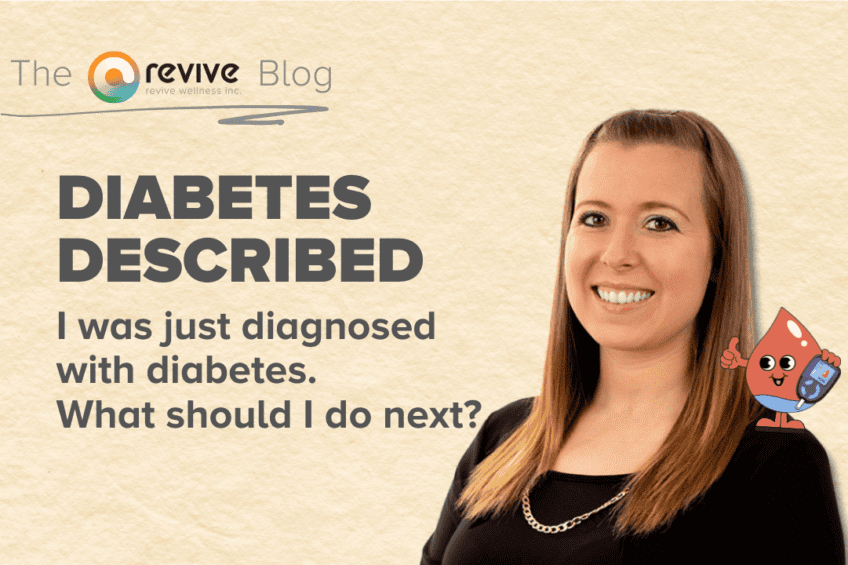Diabetes Described Series: I was just diagnosed with diabetes. What should I do next?
- Kaylee Turner
- June 28, 2024
Hearing from your doctor that you have been diagnosed with diabetes can be overwhelming. Whether your doctor says type-1 diabetes, type-2 diabetes or pre-diabetes, it can be a lot to hear. Many people leave their doctor’s appointments thinking, “What should I do next?” Often, when I talk with people, the first thing I hear is that they went home and Googled “What to do for new diabetes diagnosis.”
Unfortunately, most websites people first look at are not credible and do not give accurate information. Then the question remains, “What should I do when newly diagnosed with diabetes?” This article lists below the first five things anyone newly diagnosed with diabetes should do.
1. Book an appointment with a healthcare professional to learn more information from a credible and reliable source.
Healthcare professionals like Registered Dietitians and Certified Diabetes Educators are educated and trained to provide evidence-based advice (1,2). Research has shown that nutrition therapy can improve blood sugar control and reduce glycated hemoglobin (Hb A1C) by up to 2% (3). When you first find out that you have diabetes, start thinking about setting up an appointment with a Registered Dietitian and Certified Diabetes Educator right away. Seeing a Registered Dietitian who is also a Certified Diabetes Educator has added value, as that healthcare professional has chosen to specialize in Diabetes and can give the most up-to-date, evidence-based information and help. Luckily, I am a Registered Dietitian and Certified Diabetes Educator with the team at Revive Wellness! You can book a discovery call with me today to learn more about how I can best help you successfully manage your diabetes.
2. While you are waiting for your Registered Dietitian appointment, you can start looking for credible information online.
Ensure that you are looking at well-credited websites like Diabetes Canada. Be cautious looking at other websites as they may not provide credible information. Remember, anyone can post anything online. Diabetes Canada has many reliable, evidence-based resources, which you can review to learn new things about your diabetes and help prepare you for your appointment with a Registered Dietitian (4).
3. Journal one complete day
Journal one complete day of eating and drinking. Try this by writing down on paper everything you have to eat and drink. Be as detailed as possible by including the times and approximate portions of what you ate that day. The main goal here is to become consciously aware of what you are fueling your body with. Once you become more aware of what you are putting in your body (both food and fluids), you can begin making small changes with the assistance of a healthcare professional. After starting this journal, it will be very helpful to discuss it in more detail with a Registered Dietitian.
4. Start with just one small change
Making lifestyle changes to manage your diabetes can be very overwhelming. Don’t overload yourself with trying to do everything at once. Instead, start with one small change. Whether it’s working to reduce pop intake in your day or working to eat breakfast daily, any small change can make a big difference in your diabetes management.
5. Maintain regular contact with your doctor
In the first couple months after your initial diabetes diagnosis, your doctor will want to maintain regular contact with you to monitor your blood work. Ensure that you are taking charge of your diabetes by scheduling and attending these appointments regularly and talking with your doctor about any questions or concerns that you may have. Checking bloodwork every 3-6 months is the gold standard for managing your diabetes (1).
Hearing that you have diabetes can be quite overwhelming. With that being said, the first goal is to take charge and start planning how we can best manage your blood sugar levels effectively. Working closely with me at Revive Wellness, we can help balance your eating, increase your activity, and much more. My approach is to meet you where you are and find unique strategies to help you succeed in your diabetes management. If you are ready to take the next step, book a discovery call with me today!
References
- Nutrition for disease management. (n.d.). College of Dietitians of Alberta. Retrieved 28 June 2024, from https://collegeofdietitians.ab.ca/public/the-food-experts/how-an-rd-can-help-with-disease-management/
- How can a CDE® help me? (n.d.). CDECB. Retrieved 28 June 2024, from https://www.cdecb.ca/how-can-a-cde-help-me/
- Nutrition therapy—Diabetes canada. (n.d.). DiabetesCanadaWebsite. Retrieved 28 June 2024, from https://www.diabetes.ca/health-care-providers/clinical-practice-guidelines/chapter-11
- Canada needs a nation-wide diabetes strategy now—Diabetes Canada. (n.d.). DiabetesCanadaWebsite. Retrieved 28 June 2024, from https://www.diabetes.ca/
- Healthy Lifestyle Edmonton | Take Control of Your Health. (n.d.). My Viva Inc. Retrieved 28 June 2024, from https://discover.myvivaplan.com/new-home-page-design/
- Canada, H. (2020, June 29). Make healthy meals with Canada’s food guide plate. Canada Food Guide. https://food-guide.canada.ca/en/tips-for-healthy-eating/make-healthy-meals-with-the-eat-well-plate/
Continue reading
About the Author

Kaylee Turner
When I was younger, I knew I wanted a career where I could help people and make a difference in their lives. We live in a world where diabetes and chronic diseases are so common, and the problem is that many people don’t know where to find reliable information. I take pride in keeping up to date on research, attending conferences around diabetes, and providing the best evidence-based care possible. I have specialized in diabetes full-time since 2020, and I completed my Certified Diabetes Educator (CDE) certification in 2023.

